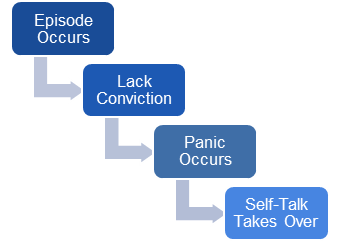Emotional involvement is an interesting self-limiting belief. It has a massive rippling effect on your business. As with need for approval, emotional involvement happens to everyone. The questions are: Where does it happen? Why does it occur?
Emotional involvement typically impacts efficiency and effectiveness in running a business by 32%. 32% is a large enough number that it should be on your radar screen for your development plan. In this article, I will discuss negative emotional involvement.
Negative Emotional Involvement
Since we don’t have the knowledge and conviction in our ability to handle the situation, panic sets in. The result? Your brain shuts down, which causes what we call self-talk. You start to have a conversation with yourself. You are still in the meeting, still interacting with the other party whose mouth is moving, but what you hear is yourself. You hear your internal dialogue, things like, uh oh, oh no, why are they saying that? how did I get here? I don’t know the answer to that, and so on. We have all seen or experienced the signs: the sweat, blood rushing to the face, deer in the headlights look, marble in the mouth and stammering. Have you ever seen people who just talk – no purpose, no direction – just talk? They’re lost, and they shockingly think, “If I keep talking, I can get myself back on track.”
Lack of conviction in our ability to say and do the “right” thing is the most common cause of emotional involvement. Remember this Sandler selling rule, “Your prospect will always tell you what you need to know to close them, if they are closeable.”
Negative emotional involvement also occurs when we financially need the business. When a salesperson is in a position of needing to make the sale, that financial pressure typically causes the individual to become emotionally involved. This occurs especially if the sale is going backward or nowhere. Don’t misunderstand me. Money is great, but the key is to want the money, never need it.
EMOTIONAL INVOLVEMENT |
When want becomes need and the salesperson encounters a situation where the sale is slipping away, they start to stammer, get excited and get nervous. They are terrified of losing something they don’t yet have. The exact point at which an individual loses control of their emotion, they’ve lost the game.
Let me outline some of the strategies you can use yourself and with your team.
- We have to understand and buy in to the fact that we all have emotional involvement.
- “You must be a third person to your own selling event.” Take notes and identify exactly what caused the moment of panic. Joint work is the easiest way to accomplish this.
- Role play, role play, role play…and do more role play.
- Never be in a situation to need the business. Keep your pipeline full.
- Properly pre-brief a sales meeting.
- Properly de-brief a sales meeting.
- Properly conduct one-on-one coaching sessions.
|
How to Fix Emotional Involvement
To fix emotional involvement, you must develop total and absolute faith and trust in your ability to say, do and respond the “right” way in any given situation. Once you have 100% total and absolute faith and trust in yourself, you will become relaxed. Once you become relaxed, you listen. And once you listen, “Your prospect will always tell you what you need to know to close them, if they are closeable.” The signs are always there. The problem is that sometimes we are all caught up in our own stuff that we are not paying attention.
In summary, emotional involvement is triggered by a specific situation which causes self-talk. Self-talk is just like quicksand. The more you try to get out of it, the more it draws you in. You lose control, you lose objectivity, and you are done. Come to grips with the fact you have emotional involvement. If you identify the cause, you can fix it. Role play the competencies needed in a specific situation until you can do it in your sleep. Develop 100% conviction in your ability to say, act and do the correct thing. What causes you to become emotional may not be an issue for someone else. It is purely your own.
EMOTIONAL INVOLVEMENT |
Written by Glenn Mattson, President of Sandler Training, Mattson Enterprise, Inc.,
a sales and leadership consulting firm. Glenn specializes in helping sales leaders and
top-performing salespeople successfully overcome the roadblocks that hinder their ability to
achieve significant increases in their results.
If you liked this article, please visit wwww.go.sandler.com/Mattson for more information or call (631)-SANDLER to take your business to the next level.
“Our Business Is Transforming Your Business” |





